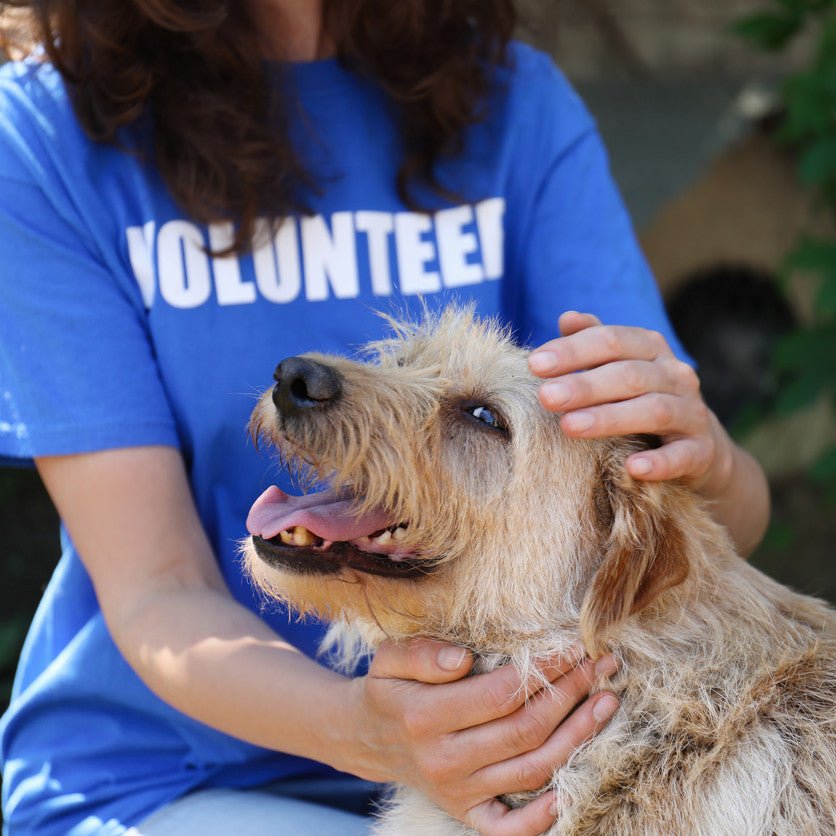Dog Volunteering Opportunities: 10 Ways to Help Dogs in Your Community

Volunteering and helping dogs across the globe is a core part of our DNA. We regularly contribute and commit to our favorite dog charity — Dogs Playing for Life. And, we take care to create high-quality, American-made products that are Prop 65 compliant, vegan, cruelty-free, and organic. In the spirit of this, we want to give everyone a quick guide to helping dogs in your community.
We know our customers love animals. So, here’s a quick guide to help you find amazing volunteer opportunities near you.
1. Training
Animal shelters have dogs in various age ranges. Many need some type of training or behavior modification. You can volunteer to help train puppies and dogs at your local animal shelter. If your shelter has puppies or young dogs, you might help with crate training and teaching pups basic commands, like sit, stay, come, etc. Some older dogs who land in a shelter have behavior struggles or never receive proper training. You can also work with these dogs to help them learn commands and behavior that make them more desirable for adoption.
Often, troubled dogs simply need love and attention. Positive training can help them find fantastic homes. While a quick call to your local shelter or no-kill charity will likely lead to opportunities, charities like Canine Companions have a strong presence across many American communities.
2. Hygiene
Unfortunately, many dogs that come to an animal shelter have been neglected. Some have been abandoned or confiscated by law enforcement. The signs of neglect and sometimes abuse are easily identifiable because the dogs haven't been groomed or bathed. Similarly, some shelters do not have the staff to maintain the cleanliness of dogs. Volunteering to groom and bathe dogs at your local shelter goes a long way to showing love and care to furry friends.
Here is a great account of someone who regularly grooms and bathes rescued or soon-to-be-rescued animals.
3. Activity
Dogs of all ages need regular exercise and playtime to stay healthy. The kennels at most shelters are not large enough to offer adequate room for dogs to run. Plus, they need fresh air too! You can volunteer to go for a run or walk with dogs in your community shelter. Or, you can spend time playing. This helps keep our canine friends healthy and socialized while awaiting placement with their new forever families. This is the charity we donate to (and sit on the board of) specializes in. But there are plenty of other local charities that provide these services. As a side note, if you have a shelter near you that you believe would benefit from Dogs Playing for Life, give the charity a call. Volunteers travel across the country to provide ample playtime and love to unfortunate pups.
4. Adoption Events
Many animal shelters hold adoption events to find homes for the animals they house. Sometimes these events are at the shelter, but shelters often hold these events off-site. Families, couples, and singles alike attend these events to interact with the shelter's animals and find a pet they can adopt. However, interaction needs to be supervised, and shelters need people to handle the dogs and tell people about each dog's history, personality, and special needs, if applicable.
It’s important to remember that there are always ways to help. You can even invent your own. Check out how this class of young students helped adopt out every pup at their local shelter.
5. Outreach
Partnering with a shelter to help with community educational outreach is another way you can help the dogs in your community. Outreach includes information about adoption, pet care, breeds, and more. You help people understand the adoption process and encourage them to consider the available dogs at the shelter. Additionally, you can keep some dogs out of the shelter when you educate pet owners about pet care and different breeds.
6. Cleaning
Shelters are active places, and they need to be kept clean to provide a healthy environment for the animals who live there. You can volunteer to do general cleaning inside the shelter, scooping poop in the outside kennels, and cleaning indoor kennels. While cleaning isn't the most glamorous activity, it's one of the most needed and most helpful for animal shelters. It prevents dogs from suffering illness because of uncleanly conditions.
7. Transportation
Another way to help dogs in your community is to ensure they get the medical treatment they need from their veterinarian, especially in shelters not located at a vet clinic or animal hospital. You can volunteer to transport dogs to and from the vet for check-ups, shots, and treatment when necessary. Additionally, sometimes dogs need transportation to a foster home. Don't worry, though! You don't have to stick your head out the window and stick your tongue out when volunteering for transportation service. You can leave that to your furry friends.
8. Photography
Animal shelters and dog rescue organizations have websites and/or social media accounts. The needs of the animals come first, so sometimes websites and accounts get neglected. You can volunteer to take quality photos of dogs for shelters if you have camera skills. This helps keep everything updated and attracts more people to adopt dogs who need a loving home.
9. Administrative
Work Shelters have loads of paperwork, like any other organization. Administrative work is a catch-all that includes various ways to help a shelter. You can file paperwork, help with data entry, answer the phone, update websites, post about the shelter's dogs on social media, and do other things. If you want to help dogs but don't necessarily want hands-on work, helping with administrative tasks frees up others to engage with a shelter's dogs.
10. Fostering Dogs
Shelters are often full or overcrowded during certain times. Other times, some dogs need individualized attention that they won't get in a shelter. Pet foster parents are a crucial part of adoption and shelters. A dog often behaves differently when they settle in a home compared to a shelter. When you foster dogs, you see their personalities come out and learn their habits, strengths, and weaknesses. You can share what you learn about your foster dog, making finding them a permanent home much easier.
A Final Word
We are very passionate about this subject (we have personally adopted and saved all of our dogs from shelters with kill policies). But it’s important to remember that volunteering with dogs isn’t for everyone. Some of these dogs are aggressive, formerly abused, and emotionally scarred. You need to be careful, loving, and extremely forgiving to work in these environments. If you do not feel comfortable in that type of environment, you can always donate money or use your skillset to provide value to these charities. There are a million ways to help, you just need to find the way that makes the most sense for you.
Subscribe
Sign up to get the latest on sales, new releases and more…
Categories
- Dog UTI Symptoms: How to Spot, Treat, and Prevent Urinary Tract Infections
- Psyllium Husk for Dogs: Science-Based Benefits, Dosage and Use
- Dog Meal Prepping : A Complete Guide to Healthy, Time-Saving Homemade Meals
- Best Places to Take Your Dog on Vacation this 2026(USA Edition)
- Tails of Celebration: Working Dogs of the Lares Trek, A Silent Partnership In Peru
- 5 Easy Organic Christmas Recipes for Dogs: Simple Holiday Treats Your Companion Will Love
- The 6 Best Luxury Gifts for Your Dog This Christmas: Thoughtful Holiday Comfort That Truly Lasts
- Why Playtime Matters: The Benefits of Mental Stimulation and Playtime with Your Companion
- Tails of Celebration: The Miao Dog-Carrying Festival - A Hero's Honor in China
- A Dog-Friendly Thanksgiving 2025: Comfort, Calm, and Easy Treat Recipes
- The Best Dog Beds for Winter 2025: 5 Luxury Styles for Warmth, Comfort & Orthopedic Support
- Tails of Celebration: The Feast of Saint Hubert — Belgium's Timeless Blessing
- Halloween Safety Tips for Dogs: How to Keep Your Companion Safe This Spooky season
- Tails of Celebration: Día de los Muertos / Day of the Dead for Pets, A Festival of Memory in Mexico
- How to Care for Senior Dogs in Fall: Mobility Tips & Joint Support
- Tails of Celebration: Kukur Tihar & The Tihar Festival of Nepal
- What is a VDI Testing for dogs ? : Insights, Procedures and Preventive Measures
- Cheap Dog Beds vs. Luxury Dog Beds: The Real Cost of a $50 "Disposable" Dog Bed
- Can Dogs Have OCD? Understanding Canine Compulsive Behaviors (CCD)
- Does My Dog Like Music? Find Out What Tunes Make Your Pup Wag!
- Effective Solutions for Food Aggression in Dogs
- 7 Frozen Treats Your Dog Will Love This Summer☀️🧊🍉
- The Best Waterproof Liners for Dog Beds: Protect Against Spills, Drool, and Accidents
- How to Cope with the Loss of a Dog: A Tribute to Every Companion We Carry in Our Hearts
- Top Tips on How to Prevent Matting in Dogs
- Understanding and Managing Dogs with Hip Dysplasia
- The Ultimate Guide to Dog Gut Health: Natural Remedies, Probiotic Insights and Signs of Poor Gut Health
- The Best Supplements for Dogs: Explore Top Picks for Canine Health and Wellness
- How Often Should I Brush My Dog's Teeth? Tips for Optimal Canine Dental Health
- Ultimate Guide on How to Comfort Your Dog During Fireworks this 4th of July
- Managing a Blowing Coat: Essential Grooming Tips for Double-Coated Dogs.
- 5 Daily Habits That Boost Your Dog’s Long-Term Wellness
- Mastering Crate Training a Dog: Tips and Benefits
- Dog Car Seats vs. Seat Covers: What’s The Best Option For Your Companion?
- Best Outdoor Dog Beds: Luxury, Durability, and Unmatched Comfort
- Is My Dog Overweight? Tips to Assess and Help Your Companion
- The Best Faux Fur Dog Beds for Ultimate Pet Comfort of 2025
- Dog Running Guide: How to Start, Train & Stay Safe when running with your Dog
- Indestructible Dog Beds? The Truth Behind the Term
- Top Tips for Effective Exercise for Dogs
- Effective Dog Ear Cleaning: A Step-by-Step Guide for Maintaining Healthy Ears
- How to Manage Dog Aggressive Behaviors: Expert Tips and Advice
- Effective Canine Ear Infection Remedies: Symptoms, Causes & Treatments
- How to Make a New Dog Comfortable in Their New Home - 2025 Guide
- Signs of Dog Allergy Symptoms and How to Help and Prevent Them
- Why Does My Dog Lick Their Paws? Causes and Solutions Explained
- Dog Alzheimer's: Symptoms, Causes, and Treatment Options
- The Legacy of Comfort with the Iconic Animals Matter® Ortho Companion-Pedic® Puff Luxury Dog Bed
- Orthopedic Square Dog Beds: The Ultimate Blend of Luxury, Comfort, and Support
- Loungers: The Ultimate Beds for Luxury, Comfort, and Orthopedic Support


Leave a comment
Please note, comments must be approved before they are published